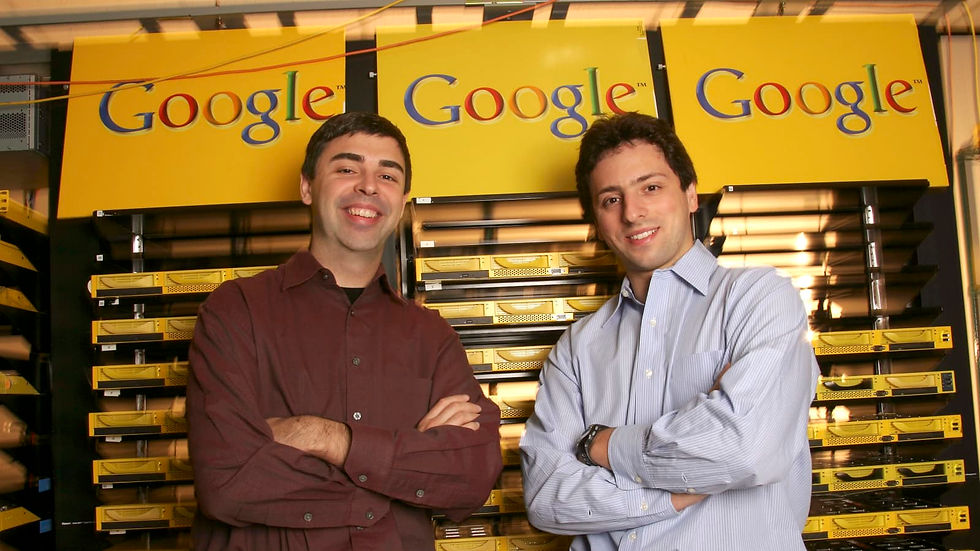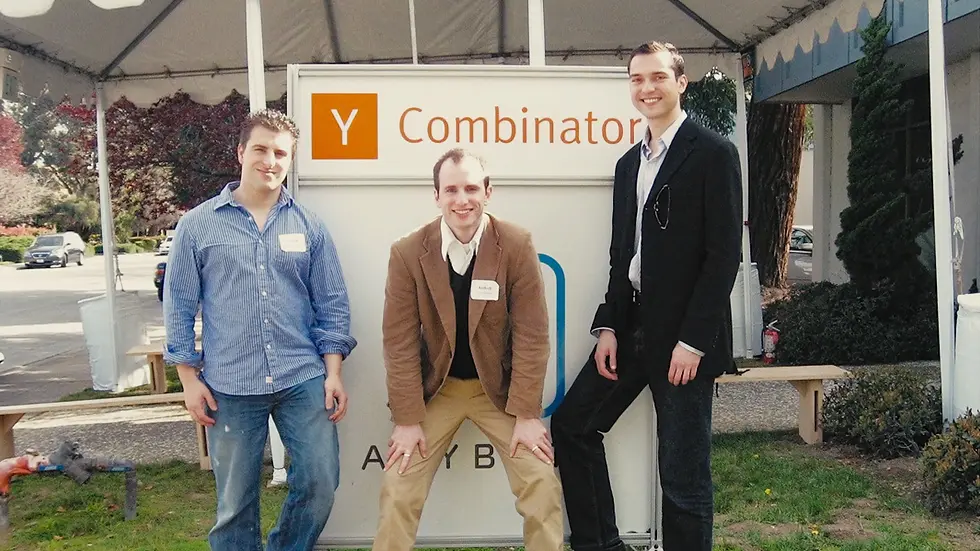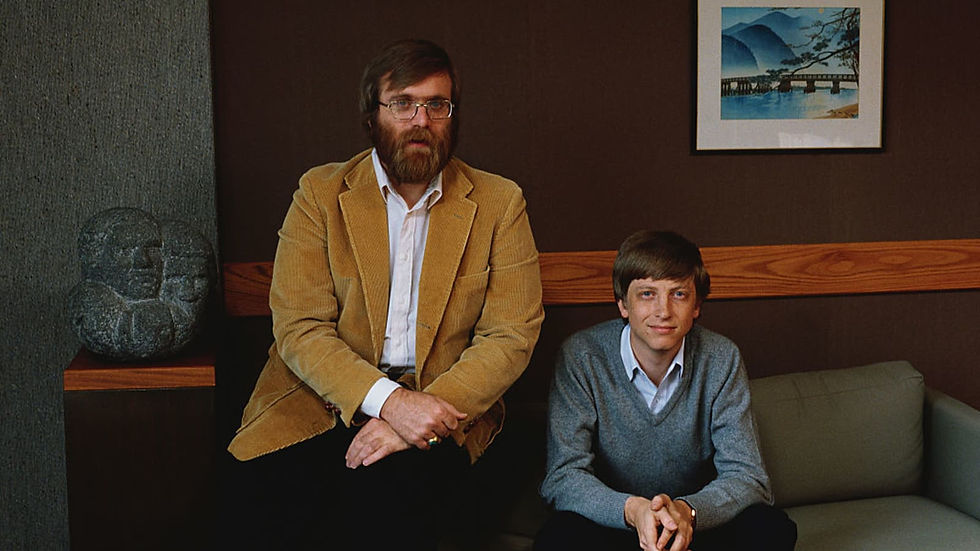The Co-Founder Conundrum: Sam Altman's Guide to Startup Partnerships
- Startup Bell
- 5 days ago
- 9 min read
In the high-stakes world of startups, few decisions matter more than choosing the right co-founder. Sam Altman—former president of Y Combinator and current CEO of OpenAI—has seen thousands of startups rise and fall. His insights are not just opinions; they are data-backed wisdom that can transform your startup dream from a lonely pursuit into a thriving partnership. In this article, we’ll explore Altman’s advice on finding the ideal co-founder, blending it with real-world examples and key lessons from some of tech’s most successful companies. If you’ve ever wondered how to build a startup team that can weather the storm of uncertainty and scale to success, read on.

The Startup Journey: Why Your Co-Founder Choice is Critical
Building a startup is like setting out on an epic journey. It requires vision, tenacity, and—most importantly—a partner who shares your passion and complements your skills. Altman’s approach is clear:
“A good way to meet a co-founder is in college. If you're not in college and you don't know a co-founder, the next best thing, I think, is to go work in an interesting company. If you work at Facebook or Google or something like that, it's probably almost as co-founder rich as Stanford.”
This simple yet profound piece of advice sets the tone for what follows. Whether you’re a student in a bustling university or a professional immersed in a vibrant tech company, the environment you choose can shape your future in profound ways. But why is the co-founder relationship so important?
The Weight of Partnership
The reality of startup life is brutal. The journey is riddled with long hours, unpredictable challenges, and moments that test your resolve. When you embark on this path alone, every setback feels like a personal failure. However, the right co-founder not only shares the burden but also offers diverse perspectives, emotional support, and a much-needed sounding board for ideas. Many studies—and the data from Y Combinator—demonstrate that nearly all of the top startups have at least two founders. In contrast, solo founders often struggle under the pressure, facing immense challenges that could be mitigated through collaboration.
The College Connection: A Natural Incubator for Co-Founders
Universities are more than just centers of learning—they are crucibles for innovation and long-lasting relationships. Altman emphasizes that college is one of the best places to meet your future co-founder, and history has repeatedly proven him right.
Dorm Room Dreams Turned Global Empires
Take Google, for instance. Founders Larry Page and Sergey Brin met at Stanford University, a place known for its relentless pursuit of knowledge and innovation. Stanford wasn’t just an academic institution for them; it was the perfect environment to test ideas, face challenges together, and ultimately build a revolutionary product. The camaraderie, late-night coding sessions, and shared vision laid the groundwork for what would become one of the world’s most powerful companies.

Similarly, Facebook’s origins lie within the hallowed halls of Harvard. Mark Zuckerberg and his co-founders—Eduardo Saverin, Andrew McCollum, Dustin Moskovitz, and Chris Hughes—launched their social network from a college dorm room. Their daily interactions, debates over technical and design choices, and shared sense of urgency provided a robust foundation for building a platform that would redefine social networking globally.

Real-World Example: Airbnb’s Creative Spark
Consider the story of Airbnb. Founders Brian Chesky and Joe Gebbia met at the Rhode Island School of Design. Their shared background in design and their natural ability to think creatively led them to experiment with an idea that seemed far-fetched at the time—turning their own apartment into a temporary lodging space during a design conference. This innovative idea, nurtured by their college connection, eventually transformed into a billion-dollar company that reimagined travel and hospitality.

Colleges provide a natural testing ground for potential co-founder relationships. In the low-stakes environment of academia, you can see how someone handles stress, criticism, and the pressures of deadlines. This “pre-gaming” of startup life allows you to build a trust foundation before venturing into the unpredictable world of entrepreneurship.
The Corporate Incubator: A Modern Talent Pool for Future Co-Founders
Not everyone is in college when the startup bug bites. For those in the professional world, Altman suggests another rich hunting ground: innovative companies.
“If you work at Facebook or Google or something like that, it's probably almost as co-founder rich as Stanford.”
Corporate Ecosystems as Matchmakers
Tech giants like Facebook, Google, and Amazon are not just innovators—they’re also ecosystems teeming with brilliant, ambitious minds. These companies attract top talent, foster intense collaboration, and create environments where the next breakthrough partnership might just be a conversation away.
Consider the legendary “PayPal Mafia.” After the sale of PayPal, a cadre of its former employees went on to create or co-found some of the most disruptive companies in tech, including Tesla, LinkedIn, YouTube, and Yelp. The experience at PayPal wasn’t just about learning how to build a product; it was about understanding the intricacies of teamwork, leadership, and navigating high-pressure situations.
Working at a renowned company doesn’t just help you gain technical skills; it exposes you to a culture of innovation and a network of potential co-founders. In these environments, you witness firsthand how top performers handle setbacks, adapt to new challenges, and collaborate effectively—a perfect testing ground for a future business partnership.
The Solo Founder Paradox: Why Going It Alone Isn't Ideal
While some entrepreneurs might feel that they’re best suited to venture solo, Altman warns against the risks of going it alone. His data-backed observation is stark:
“It's better to have no co-founder than to have a bad co-founder, but it's still bad to be a solo founder. For the top 20 most valuable YC companies, all of them have at least two founders. We probably funded something like one out of ten solo teams.”
The Burdens of Being Alone
Being a solo founder might seem appealing if you value complete control, but the reality is that startups are incredibly demanding. The sheer volume of work, the emotional roller coaster of highs and lows, and the need for diverse perspectives can overwhelm even the most brilliant minds.
Imagine the challenge of navigating the complex world of business without someone to share your vision, debate your strategies, and support you during setbacks. The emotional and logistical weight of every decision rests solely on your shoulders, making the path to success significantly more arduous.
Real-World Example: Elon Musk’s Grueling Journey
Consider the cautionary tale of Elon Musk during Tesla's early days. Though technically not the founder, Musk took control early and often describes the immense personal toll of essentially being a solo leader during critical periods. In 2018, he described working 120-hour weeks, not leaving the factory for days, and having his health deteriorate. "No one should put this many hours into work," he said in an emotional New York Times interview. Even someone with Musk's legendary drive found the solo journey nearly unbearable.
Why a Bad Partnership is Worse Than Going Solo
However, Altman also cautions that having a poor co-founder can be even more damaging than trying to go it alone. A mismatched partnership can lead to endless conflicts, misaligned visions, and a toxic work environment that stifles creativity and progress. It’s a delicate balance: while the solo route is fraught with challenges, a bad co-founder can derail the entire venture.
This is why the quality of the co-founder relationship is paramount. The goal is to find someone you know well—someone whose strengths, weaknesses, work ethic, and values align with yours. This “gold standard” of co-founder relationships significantly boosts the odds of success.
The Hierarchy of Founding Relationships: What Altman Really Means
Altman lays out a clear hierarchy when it comes to founding relationships, which we can summarize as follows:
Co-founder you know well: The ideal scenario. You’ve worked together, built trust, and understand each other’s strengths and weaknesses.
Solo founder: Not optimal, but better than a bad partnership. You avoid the pitfalls of conflict, though you miss out on the benefits of a collaborative team.
Random co-founder: The danger zone. Rushing into a partnership with someone you barely know is a recipe for disaster.
The Marriage Analogy
Choosing a co-founder is a lot like choosing a life partner. Would you get married after a handful of coffee dates or based solely on a few online chats? Likely not. Yet, many entrepreneurs fall into the trap of “co-founder dating,” partnering with strangers or casual acquaintances without adequate vetting. This hasty decision can lead to misaligned visions, unresolved conflicts, and equity disputes down the line.
Take Twitter’s early days as a cautionary tale. The relationships among co-founders like Jack Dorsey, Evan Williams, Biz Stone, and Noah Glass were fraught with tension and conflicting visions. These early rifts eventually led to power struggles and departures, illustrating the high cost of an ill-considered partnership.
The Anatomy of a Successful Co-Founder Relationship
So, what exactly makes a co-founder relationship work? The answer lies in a combination of complementary skills, shared vision, mutual trust, and effective communication.
Complementary Skills: Creating Synergy
Imagine a startup where one founder is a technical wizard while the other excels in business strategy. This classic split is seen in companies like Apple, where Steve Jobs and Steve Wozniak combined their respective talents to create a groundbreaking company. When each partner fills the gap in the other’s expertise, the startup is far better positioned to navigate challenges and seize opportunities.

Shared Vision and Values: The Heart of the Partnership
Beyond skills, a shared vision is vital. Without alignment on the company’s goals and core values, even the best-matched team can falter. When founders agree on what they’re building and how they plan to impact the world, every decision is made with a unified purpose. This shared vision is the glue that holds the team together during tough times.
Trust and Communication: The Lifeblood of Startups
Perhaps the most critical element is trust. Founders must be able to communicate openly, resolve conflicts amicably, and support each other through the inevitable ups and downs. This kind of trust is built over time—through late-night brainstorming sessions, shared successes, and even mutual failures. When trust is present, the entire startup ecosystem thrives, and challenges become opportunities for growth.
Real-World Example: Bill Gates and Paul Allen
The legendary partnership between Bill Gates and Paul Allen is a textbook example of a strong co-founder relationship. They met as teenagers, developed a shared passion for computing, and built Microsoft into one of the world’s most influential companies. Their complementary skills—Allen’s visionary ideas and Gates’ relentless drive—combined with a deep-seated trust in one another, set the stage for decades of innovation and success.

Navigating the Co-Founder Decision Framework
Sam Altman’s insights provide a clear framework for approaching the co-founder decision—a decision that might well determine your startup’s fate before you write a single line of code.
Step 1: Seek the Right Environment
Whether you’re in college or working in a tech hub, place yourself in environments where innovation thrives. Universities and companies like Facebook or Google are breeding grounds for potential co-founders. These places not only offer technical expertise but also the collaborative spirit needed to build something great.
Step 2: Prioritize Quality Over Quantity
The quality of your co-founder is paramount. It’s far better to be a solo founder than to partner with someone who isn’t aligned with your vision. Invest time in getting to know potential partners, understand their work ethic, and ensure that your values and ambitions align. The cost of a bad partnership is far too high.
Step 3: Build a Relationship Before the Leap
Treat your potential co-founder like a long-term partner. Work together on smaller projects, test your collaborative chemistry, and make sure you can navigate conflicts constructively. The goal is to build a robust foundation of trust and mutual understanding before embarking on the full startup journey.
Step 4: Recognize the Solo Founder Paradox
If you find yourself considering the solo route, be mindful of the challenges. While some entrepreneurs thrive on independence, the absence of a partner often means shouldering all responsibilities alone—both the triumphs and the setbacks. Recognize that early hires, advisors, or even mentors might help bridge the gap, but a well-matched co-founder remains the best asset you can have.
Conclusion: Your Startup’s Future is Built on Solid Partnerships
Altman’s track record with Y Combinator’s portfolio speaks volumes. The vast majority of successful YC companies were founded by teams, not solo entrepreneurs. This isn’t mere coincidence—it reflects the undeniable truth that a shared vision and collaborative drive are crucial ingredients for startup success. Whether it’s Airbnb, Dropbox, or Stripe, the most valuable startups almost always began with a solid founding team.
Whether you’re a student dreaming of changing the world or a professional ready to take the leap into entrepreneurship, the choice of your co-founder is one of the most critical decisions you’ll ever make.
Take a lesson from the giants—Google, Facebook, Airbnb, and even Microsoft. Their founders didn’t achieve greatness in isolation; they thrived because they built teams grounded in trust, shared vision, and mutual respect. As you move forward on your entrepreneurial journey, remember that the right co-founder is more than just a partner in business—they’re a partner in your dreams, your challenges, and your ultimate success.
So, ask yourself: Are you surrounding yourself with people who not only complement your skills but also share your passion for building something extraordinary? Your future startup isn’t just a product of your idea—it’s a testament to the relationships you build along the way.
Ready to build a great team and take your company to the next level? Subscribe to our newsletter for weekly insights, tips, and stories to help you lead with confidence and creativity!
Watch Sam Altman's advice:

Comments